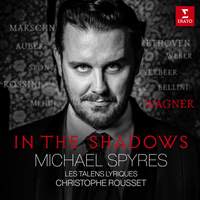Recording of the Week,
In The Shadows with Michael Spyres
As Spyres points out in his eloquent, affable booklet-note, assembling the pieces of the jigsaw was no mean feat – partly because Wagner had few qualms about downplaying the influence of his forebears (or in the case of Meyerbeer, actively denigrating their work) in the interests of playing up his own trailblazing qualities. Wagner’s respect for several of the composers here, though, is reasonably well-documented: he lavishes fulsome praise upon Weber in his autobiography thanks to a childhood encounter with Der Freischütz, and describes Spontini with near-breathless admiration after inviting the older composer to conduct La vestale in Dresden.
We begin with an excerpt from another work which Wagner openly acknowledged as a game-changer: Étienne Méhul’s 1807 opéra-comique Joseph, which he conducted during his time in Riga. The aria ‘Champs paternels’ sees the exiled hero reflecting on his longing for his father and homeland before wrestling with his anger towards his brothers, and in a performance as persuasive as this it’s easy to share Wagner’s enthusiasm: Les Talens Lyriques highlight every pungent detail in the orchestration, and Spyres captures Joseph’s conflicting emotions with real passion and pathos.
Next up is the dungeon-scene from Beethoven’s Fidelio – the programme is presented in chronological order, and whether by accident or design (I suspect the latter) the lesser-known items are effectively interspersed with more familiar fare. The period instruments evoke the murky atmosphere of Florestan’s cell with a soft-grained detail that’s markedly different from the stark brutality which Nikolaus Harnoncourt conjured up on his 1994 recording, and Spyres responds with one of the most lyrical interpretations of this scene I’ve heard: Beethoven’s notoriously challenging tessitura seems to sit quite naturally for him, so that he can greet the vision of Leonore with calm rapture rather than the manic hysteria which most singers lean into here.

One of the many pleasures of this programme is tracing connections not just with Wagner but between the other featured composers, and the aria from Rossini’s Elisabetta Regina d’Inghilterra is a case in point: written just a year after Fidelio, the scene in which the imprisoned Leicester dreams of his wife shares much common ground with the Beethoven on a musical level as well as in dramatic terms. Spyres’s phenomenal range and agility are very much to the fore here, and there’s wonderful work from the two cors anglais and piccolo to boot.
The real rarities abound with details that evidently seized Wagner’s imagination: a scene from Meyerbeer’s Il crociato in Egitto features some solemn low brass writing that seems to point the way to Parsifal, whilst an aria from Spontini’s Agnes von Hohenstaufen (receiving its first-ever recording in German) seems to look back to Rossini and Meyerbeer as well as forward to Rienzi in terms of the vocal writing.
The prayer from Rienzi itself brings some of the finest singing and playing on the album, with Spyres on radiant form and some magical colours from the brass in particular; Rousset’s shaping and shading of the postlude would almost be worth the price of the disc in itself. And it’s a rare treat to hear Arindal’s aria from Wagner’s first completed opera Die Feen, full of Sturm und Drang and a sense of a young composer brimming with ideas that will eventually coalesce into something extraordinary.
On the final track we get a tantalising glimpse of that something, in the form of Lohengrin’s 'Mein liebe Schwan' - and what an ear-opener it is to hear this music performed on period instruments. Spyres brings an uncommon warmth and humanity to the ethereal swan-knight, which whets the appetite for his debut in the role next weekend in Strasbourg…Cross your fingers for a broadcast.
Michael Spyres (tenor), Les Talens Lyriques, Christophe Rousset
Available Formats: CD, MP3, FLAC, Hi-Res FLAC




